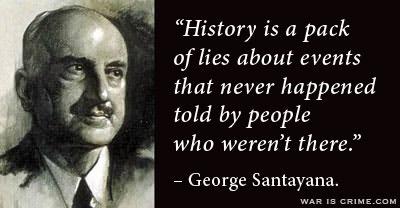Directed History is Not Conspiracy Theory
Steven Yates, Ph.D. |
December 16, 2012
I.
 Lately (example here) I’ve found myself using the phrase directed history. I didn’t invent the phrase; others have used it as well (examples here and here although the latter is a tad hysterical for my tastes). What it expresses is the idea that key events in modern history—wars, revolutions, transformations, concentrations of wealth and power, for at least the past 250 years but possibly longer—have not been random or the mere product of economic forces but were guided: directed. History has been taken in a specific direction by a powerful superelite, as I call them. I use the term superelite to distinguish from national elites.
Lately (example here) I’ve found myself using the phrase directed history. I didn’t invent the phrase; others have used it as well (examples here and here although the latter is a tad hysterical for my tastes). What it expresses is the idea that key events in modern history—wars, revolutions, transformations, concentrations of wealth and power, for at least the past 250 years but possibly longer—have not been random or the mere product of economic forces but were guided: directed. History has been taken in a specific direction by a powerful superelite, as I call them. I use the term superelite to distinguish from national elites.The superelite are global. There is an excellent case to be made that their home base is the City of London (the “City Within the City”), which headquarters the British Crown, the Bank of England, N.M. Rothschild and Sons, the London Stock Exchange, and the London School of Economics (LSE) founded by the Fabian Society and contained within the University of London. Satellite bases are to be found in Basel, Switzerland (the Bank for International Settlements), Brussels in Belgium, New York City, Washington D.C. of course, and elsewhere. Superelite goals: global economy (achieved, for the most part), global currency (a slow work in progress), global government (in the planning stages). While there is room for debate on the specifics on what the superelite want to accomplish—as a researcher drawing inferences from a variety of sources and not an insider, I don’t have a crystal ball—I sense they would prefer transitions through all these stages that are seamless as possible. Perhaps they believe the world will be a nicer place if the populations of the nations of the world simply capitulate, or just allow events to take place unnoticed. Directed history, as I conceive it, need take no stance on whether the superelite is benign or malevolent. Carroll Quigley, the macrohistorian whose ideas figure centrally into the story, believed them benign. I believe he was wrong. If they encounter sufficient resistance the superelite will have no qualms about plunging the world into whatever crises are necessary to accomplish their goals, be they economic depressions or destructive wars.
Such notions will, of course, get you branded as a “conspiracy theorist” (or worse) in mainstream media and academic circles. We all know what a terrible thing that is to be.
There is just one problem with the label: what the superelite are doing isn’t a conspiracy. The term might have applied at one time to certain of their schemes like the creation of the Federal Reserve System, but not anymore. The reason: conspiracies by definition are hidden from you. A perfect conspiracy, could there be such a thing, would be undetectable. The first job of would-be conspirators is to hide the conspiracy, and arrange things so that no one outside the circle can rationally believe there is a conspiracy. The architects of the Federal Reserve System did this for over two decades.
Directed history isn’t a conspiracy theory, because for the past couple of generations, the superelite have had members or supporting fellow travelers who were not hiding. They haven’t been shouting their plans from the roof of Congress, of course. Nor will you see them on Fox News, much less MSNBC (although it isn’t impossible). Those either believing that something was going on behind the scenes, and sometimes those actually working towards a global regime, have written down their thoughts: sometimes in books, sometimes in articles, and sometimes in speeches. Some of their writings aren’t about specific plans, but provide dead giveaways where their priorities lies. Trust me: it isn’t with We the People.
It is true that hardly anyone reads their words. This is a side effect: for well over a hundred years now their footsoldiers have been laying waste to education in this country. This started when Horace Mann went to Prussia in the 1840s and persuaded the State of Massachusetts to assist him in founding a school system based on Prussian instead of American principles. According to the latter, the individual belongs to himself and to his God. According to the former, he belongs to the state. Very slowly, public education was transformed to produce, instead of an independent and critically thinking people prepared for life in a free society, graduates who would obey government edicts, service monopolistic corporations (whether as employees or consumers), and not question authority. And attendance was made compulsory.
Read On...
© 2012 Steven Yates. All Rights Reserved.
No comments:
Post a Comment